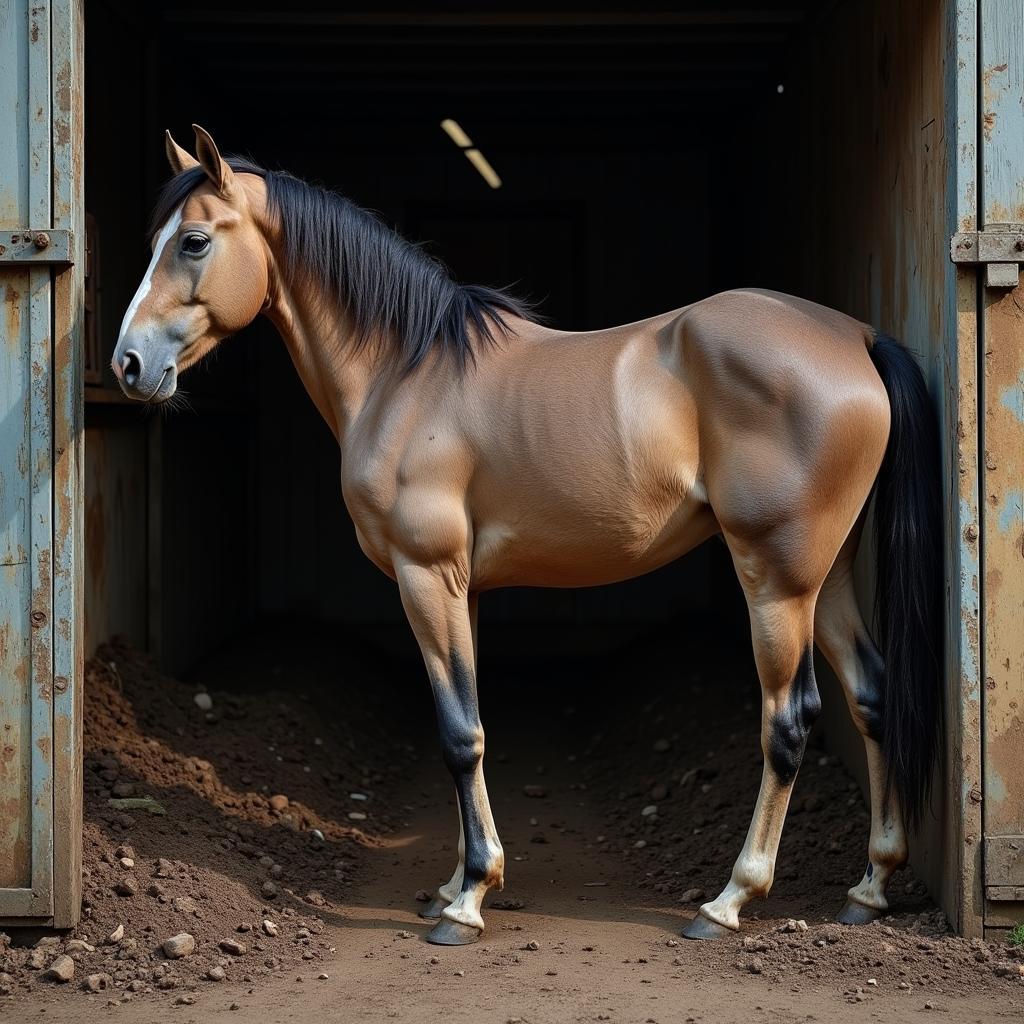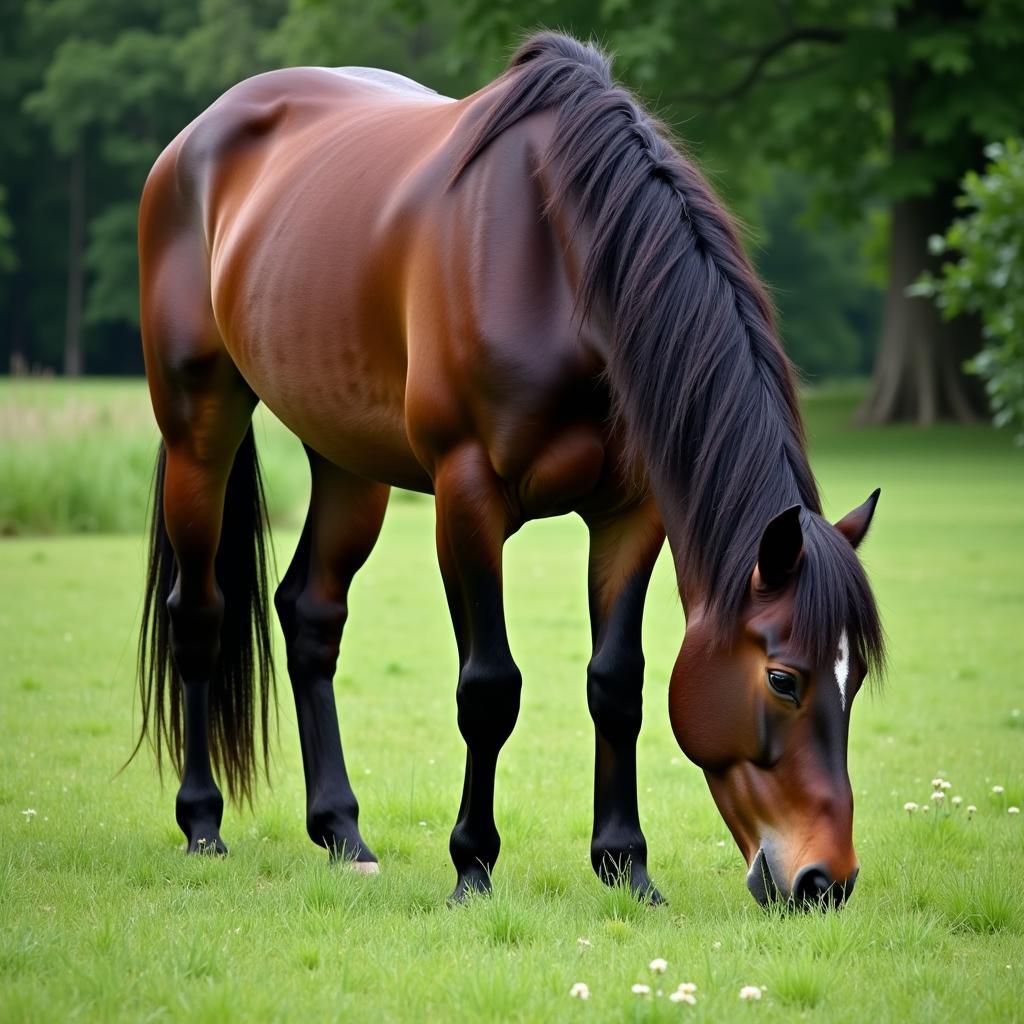“Horse Hell” is a stark term used to describe situations where horses suffer from severe neglect, abuse, or inadequate care. This article aims to shed light on what constitutes “horse hell,” its causes, and how we can collectively work towards preventing these tragic circumstances. We’ll explore the signs of neglect and abuse, discuss the importance of responsible horse ownership, and highlight the resources available for intervention and rescue.
 A horse suffering from extreme neglect, standing in a dirty stall with visible ribs, a matted coat, and a despondent expression. This image depicts the harsh realities of "horse hell."
A horse suffering from extreme neglect, standing in a dirty stall with visible ribs, a matted coat, and a despondent expression. This image depicts the harsh realities of "horse hell."
Recognizing the Signs of “Horse Hell”
Identifying “horse hell” often involves recognizing a combination of physical and environmental factors. Physically, horses may exhibit extreme thinness, with ribs, spine, and hip bones clearly visible. Their coat may be dull, matted, or patchy, and they may have open sores or wounds. Lameness, lethargy, and a general lack of responsiveness can also be indicators of underlying health issues stemming from neglect. leg yielding on a horse can sometimes be challenging for neglected horses.
Environmental Red Flags
The environment in which a horse lives can also reveal signs of neglect. Overgrown hooves, inadequate shelter, lack of access to clean water and food, and overcrowded or unsanitary living conditions are all red flags. These factors contribute significantly to the creation of a “horse hell” scenario.
The Root Causes of Equine Neglect
“Horse hell” often arises from a combination of factors, including ignorance, financial hardship, and intentional cruelty. Some owners may simply lack the knowledge or resources to properly care for their horses. Others may face unexpected financial difficulties that make it impossible to provide adequate feed, veterinary care, or farrier services. Sadly, some cases involve deliberate abuse and neglect, driven by malice or apathy.
The Importance of Responsible Horse Ownership
Preventing “horse hell” starts with responsible horse ownership. This involves understanding the significant commitment required to provide proper care, including feeding, housing, veterinary attention, and farrier services. It also necessitates recognizing one’s limitations and seeking help when needed. hello stella horse embodies the spirit of responsible horse ownership, showcasing the bond between horse and owner.
Taking Action: Intervention and Rescue
If you suspect a case of “horse hell,” it is crucial to take action. Contacting local animal control agencies, humane societies, or equine rescue organizations is the first step. Providing detailed information, including photographs and the location of the horses, can help expedite the investigation and rescue process. Sometimes, a simple item like a horse conch shell for sale can be a small reminder of the beauty of these animals and the need for their protection.
“Early intervention is key in preventing irreversible damage to a horse’s physical and mental well-being,” says Dr. Emily Carter, DVM, specializing in equine welfare. “The sooner we can intervene, the greater the chance of rehabilitation and a brighter future for these animals.”
 A healthy horse grazing in a green pasture, having been rescued from a situation of severe neglect. This image represents hope and recovery after "horse hell."
A healthy horse grazing in a green pasture, having been rescued from a situation of severe neglect. This image represents hope and recovery after "horse hell."
Conclusion
“Horse hell” is a tragic reality that demands our attention and action. By understanding the signs of neglect and abuse, promoting responsible horse ownership, and supporting rescue efforts, we can collectively work to prevent these horrific situations and ensure the well-being of these magnificent creatures. Don’t hesitate to report suspected cases of “horse hell” – every report can make a difference. Even if you’re interested in something seemingly unrelated, like a caldera race horse, understanding equine welfare should be a priority. horse pants can also be a useful tool in protecting horses from harsh weather, contributing to their overall well-being.
FAQ
- What should I do if I suspect a horse is being neglected?
- What are the legal ramifications of animal cruelty?
- How can I support equine rescue organizations?
- What are the signs of a healthy horse?
- How can I learn more about responsible horse ownership?
- Are there resources available to help horse owners in financial distress?
- What role do veterinarians play in preventing “horse hell”?
For support regarding horse welfare or other equine related matters, please contact us: Phone: 0772127271, Email: [email protected] or visit us at QGM2+WX2, Vị Trung, Vị Thuỷ, Hậu Giang, Việt Nam. Our customer service team is available 24/7.